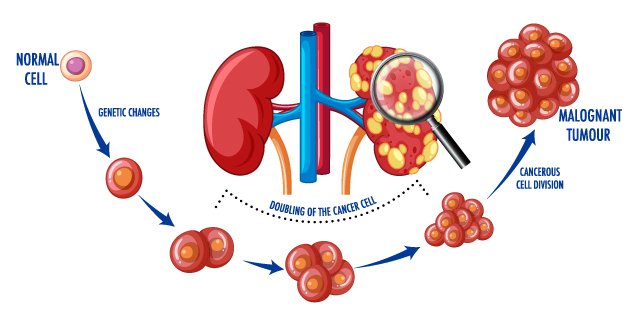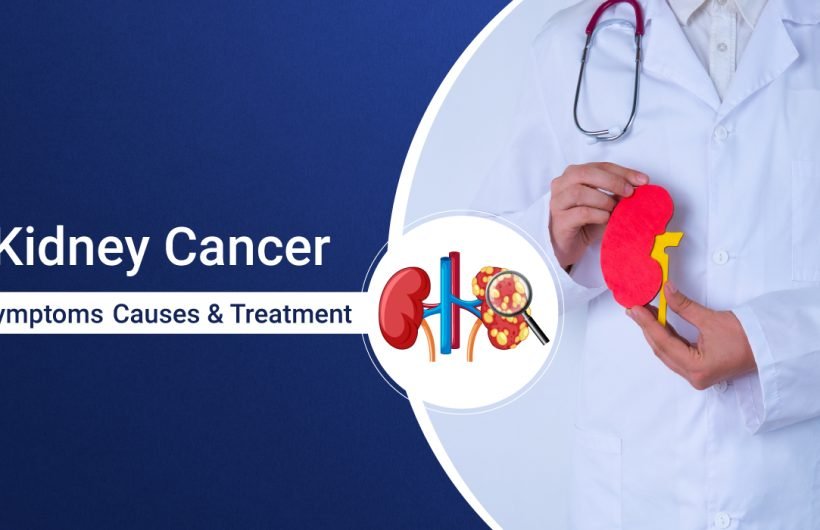Kidney cancer is a type of cancer that starts in the kidneys. Your kidneys are two bean-shaped organs that are around the size of your fist. They are situated behind your abdominal organs, one on each side of your spine.
Renal cell carcinoma is the most frequent type of kidney cancer in adults. Other kinds of kidney cancer that are less common can develop. Wilms’ tumor, a kind of kidney cancer, is more common in young children.
Kidney cancer appears to be becoming more common. One cause for this could be the increased usage of imaging techniques such as computed tomography (CT) scans. These tests may result in the inadvertent detection of more kidney cancers.
It is frequently detected at an early stage when it is tiny and restricted to the kidney.
Symptoms Of Kidney Cancer
In the early stages of kidney cancer, there are usually no signs or symptoms. Signs and symptoms may emerge over time, including:
- Blood in your urine, which could be pink, red, or cola-colored
- Intractable pain in your back or side
- Appetite loss
- Unknown cause of weight loss
- Tiredness
- Fever
Causes Of Kidney Cancer
Most kidney malignancies are unknown.
Doctors know that it begins when the DNA of some kidney cells changes (mutations). A cell’s DNA carries instructions that guide the cell on what to do. The changes tell the cells to grow and divide quickly. The accumulated abnormal cells form a tumor that can expand beyond the kidney. Some cells may rupture and spread to other parts of the body (metastasize).

The following factors can raise the risk of kidney cancer:
- The elderly: As you become older, your chances of developing kidney cancer rise.
- Smoking: Smokers are more likely than non-smokers to develop kidney cancer. After you leave, the risk reduces.
- Obesity: Obese people have a higher risk of developing kidney cancer than people who are of a healthy weight.
- Excessive blood pressure (hypertension): High blood pressure raises your chances of developing kidney cancer.
- Kidney failure treatment: People who get long-term dialysis for chronic renal failure are more likely to develop kidney cancer.
- Some inherited syndromes: People who are born with certain genetic disorders may be at a higher risk of developing kidney cancer.
- Kidney cancer in the family: If close family members have experienced this, the risk increases.
Treatment Of Kidney Cancer
Surgery to remove the malignancy is usually the first step in treating kidney cancer. This may be the sole treatment required for malignancies of the kidney. Additional therapies may be recommended if the malignancy has progressed beyond the kidney.
You and your treatment team can discuss your cancer therapy options together. The optimal method for you may be determined by a variety of criteria, including your overall health, the type of kidney cancer you have, whether cancer has spread, and your treatment preferences.
Improving your health may help lower your chance of kidney cancer. To lessen your risk, attempt the following:
- Stop smoking: Quit smoking if you smoke. There are numerous ways to quit smoking, including support groups, pharmaceuticals, and nicotine replacement products. Inform your doctor that you wish to quit and explore your choices with him or her.
- Keep a healthy weight: Maintain healthy body weight. Reduce the number of calories you consume each day and attempt to be physically active most days of the week if you are overweight or obese. Inquire with your doctor about other healthy weight-loss options.
- Keep your blood pressure under control: Request that your blood pressure be checked at your next check-up. If your blood pressure is high, you can talk about ways to lower it. Exercise, weight loss, and dietary modifications can all be beneficial. Some people may need to take additional drugs to control their blood pressure.
When to see a doctor
A kidney cancer diagnosis can be frightening, heart-breaking, and infuriating. Kidney cancer treatment, like most malignancies, is more effective when detected early. Discuss your alternatives with your doctor. Schedule an appointment with your doctor immediately soon if you develop kidney cancer symptoms such as discomfort in your side, a lump near your kidney, or blood in your pee. The doctor can do tests to discover the origin of your symptoms and create a customized treatment plan for you.
If you are looking for best treatment, you can approach Dr. Saket Narnoli. He is a well-known urologist in Dhanbad, Jharkhand. known for treating patients with the utmost care and following proper protocols.






